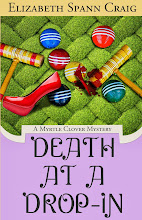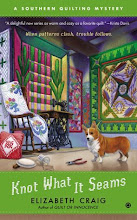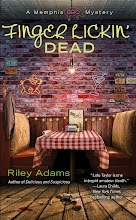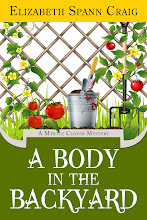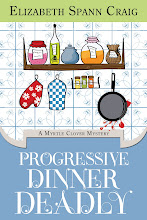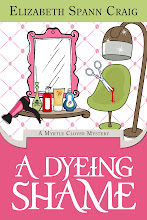Guest Post by J.E. Fishman, @JEFISHMAN
Last
year, when I was visiting a library book club to discuss my first novel, Primacy,
a woman told me she kept flicking the bedroom reading light back on because she
wanted to know what would happen next.
A
couple of months ago, a fellow writer whom I’d met on Facebook sent me a
message about my second novel that began: “I just read the prologue to Cadaver
Blues. Wow. Straight into the story and already hooked.”
Both
of these interactions — and others like them — have left me smiling over the
past eighteen months. They’re gold for an author. More important than money,
almost on par with food.
Regardless
of genre, the greatest compliment one can pay to a writer is the turning of a
page — followed, of course, by the turning of another and another.
Beautiful,
compelling prose can do that — what editors often refer to as “voice.” But
voice alone can’t carry an entire novel, and it certainly won’t carry a
mystery. People who read mysteries want more than character, great writing, and
peppy dialogue. They want to be challenged to figure something out. The puzzle,
if it’s intriguing enough, can propel much of a story forward. But if you can
also create suspense — a sense that the character faces peril — so much the
better.
The
No. 1 way to build suspense is to instill in your reader a sense of danger
without paying it off right away. Suspense ends the moment anticipation ceases.
That anticipation might be relieved by assured safety, of course, but it also
expires along with your character the moment that the knife goes in. Keeping
them waiting for that knife is the heart of the matter.
Thrillers
frequently have more suspense than traditional mysteries, but these lines have
blurred, which is all to the good. Thriller writers often introduce a mystery
element when they need to complicate their plot. And mystery writers introduce
suspense to quicken the pace.
Ah,
the quicker pace. The thing about knives is they can’t threaten on every page
or the reader becomes inured to them. So what other techniques might we use to
keep those pages turning? Here are five that I find effective both as reader
and writer.
1. Make us care.
Perhaps
it should go without saying that we need to care about the protagonist, but how
does one make the reader care? First of all, bring the character to life
through particular elements of characterization — appearance, tics, manner of
speech, etc.
Second,
give the character something or someone to care about. People who care about
something are more interesting and sympathetic than people who just float
through life. The target of that caring could be a person, a pet, a possession,
or a cause — any number of things. It doesn’t matter what, exactly. We root for
people who have a stake in life.
Least
important, I think, is for your character to be likable. Some will argue with
that statement, but I think we ultimately care more about a character who is
interesting than one who is nice.
Once
you have that interesting character sketched out — or even before — introducing
a sense of foreboding is a great way to get us behind him.
Phillip
Margolin begins Chapter One of The Burning Man as follows: “On the day
the gods chose for his destruction, Peter Hale ate his breakfast on the terrace
of his condominium.” What an effective opening! I don’t know about you, but I’d
personally allow Margolin to bore me to death for the next thirty pages just to
learn how the gods plan to destroy Peter Hale.
2. Limit the field.
The
closer your protagonist gets to the source of danger, the greater the suspense
and the faster the pace.
Proximity
is a powerful source of suspense, even when danger isn’t involved. Think about
your last trip to somewhere you really looked forward to going. Maybe it was a
visit to a national park or a play in the big city. Most of us start out at a
leisurely pace, but as we get closer we speed up to meet the anticipation.
The
protagonist of a mystery isn’t closing in on the theater; she’s closing in on
the truth. But the truth is dangerous because a murderer will be exposed.
In
a thriller, the protagonist is closing in on the antagonist (or vice versa).
The closer he gets, the greater the pace, because a physical threat is most
easily carried out in close quarters. When the antagonist is halfway around the
world, we may be willing to set the book aside. When the antagonist is in the
back of the car, those pages will turn.
3. Raise the stakes.
This
one may seem like a contradiction to Nos. 1 and 2, but they can all complement
one another.
Even
if we already have a sympathetic protagonist who’s in danger, we feel more
strongly for that character’s fate if she willingly risks her life for
something bigger.
First
of all, seeking out danger shows moral fiber — something the character cares
about bigger than herself. As the business guru Tom Peters wrote (quoting Texas
Bix Bender), “You can pretend to care. You cannot pretend to be there.” Risking
your life for something bigger than you is a sign of authenticity.
Second,
bigger stakes are...well, BIGGER. If Asia is threatened with obliteration,
that’s four billion people, which is a lot more than one.
But
here’s the caveat about those stakes. Notice I didn’t say, “Have big stakes.” I
said, “Raise the stakes.” If Asia will be nuked, who cares? Don’t know
any of those people. If, on the other hand, the protagonist I’ve come to know
and love may be nuked while trying to save Asia, now you’ve got me.
Fiction
— even when it has broad themes — always goes from the specific to the general.
Never the other way around.
4. Keep us hanging.
Remember
that knife. The moment it falls, the suspense dissipates.
As
a storytelling technique, the cliffhanger used to get a bad rap. It was said to
belong in the realm of hack writers who relied on cheap tricks. Bull-dingy!
Everyone uses cliffhangers, even literary novelists. Why? Because they work.
The
cliffhanger is nothing more than a cutaway employed when something important is
about to happen to the protagonist. If your protagonist is suspended over a pot
of boiling oil at the end of Chapter 35, why pay off the scene right in Chapter
36 when instead you can go to a completely different location and character and
get your reader to keep turning pages to see what happens?
Best
of all, have the intervening chapter (or chapters) focus on someone who cares
about that character. Maybe he doesn’t know what’s happening to her — or maybe
he’s racing to save the day.
5. Leave something out.
If
you’re a reader or writer of mysteries, you have to love the phrase, “The
mystery deepens.” It’s an invitation into the abyss, isn’t it? Something was
missing. Now, suddenly, even more is missing!
When
it comes to suspenseful storytelling, what the author leaves out is as
important — perhaps more important — than what he puts in. Say the maid found
the butler dead in the library. The mystery, of course, is who killed
him and why. But what if we also don’t know how? Doesn’t that add
to the intrigue? You bet it does.
All
novels complicate the plot as they go along. In page-turners, each revelation
both advances our understanding and, at the same time, raises further
questions. And fresh questions keep readers turning pages.
Storytelling
is a form of manipulation, but the more the reader feels manipulated, the more
you run the risk of losing her. So use these techniques as artfully as you can.
Combined with the core of a great mystery, they’re guaranteed to keep your
readers up at night.
He
divides his time between Chadds Ford, Pennsylvania, and New York City. Follow
him through his website at http://jefishman.com .
 I’ve heard that in the past, writers would hear reactions to their work in very limited ways. They’d either get a review in a newspaper or they’d get letters from readers, passed on to them through their publisher.
I’ve heard that in the past, writers would hear reactions to their work in very limited ways. They’d either get a review in a newspaper or they’d get letters from readers, passed on to them through their publisher.











